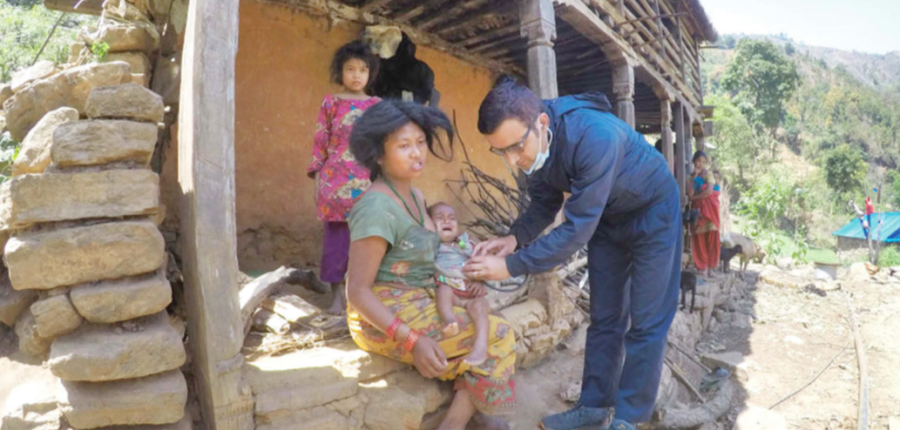National
Measles outbreaks reported in five districts including in Kathmandu and Lalitpur in last one month
Doctors warns continuous disruption in routine immunisation could put lives of thousands of children at risk
Arjun Poudel
Measles outbreaks have been reported in several districts including in Kathmandu and Lalitpur amid the ongoing coronavirus lockdown.
Since the government enforced a nationwide lockdown on March 24 to contain the spread of Covid-19, measles breakouts have occurred in several parts of the country with at least two confirmed fatalities in Dhading district.
The latest cases have been reported in Kathmandu and Lalitpur.
In Kageshwori Municipality-6, Kathmandu, at least six children between the ages of six months and 14 years were diagnosed with the highly contagious disease in the past one week, Dr Biplav Adhikari, chief of Mulpani Primary Health Care Center, said.
"Five of these cases were confirmed by laboratory test and the other cases were confirmed based on clinical symptoms," Adhkiari told the Post.
In Khokana, Lalitpur, at least 18 cases have been confirmed by the Immunization Section of the Department of Health Services.
Before this, measles outbreaks were reported in Jhapa, Sarlahi and Dhading.
Health officials said they had not witnessed so many outbreaks take place in a short span of time in recent years.
With the entire country under lockdown, routine immunisation programmes have been affected in several districts. Health officials say Rubeola virus, which causes measles and is far more contagious than the novel coronavirus or SARS-CoV-2, is rearing its head as the country is observing stay-at-home orders to prevent the spread of coronavirus.
Many health facilities have discontinued their regular immunisation programmes while parents too have stopped seeking inoculation services for their children during the lockdown.
Dr Shyam Raj Upreti, former director of the erstwhile Children Health Division, warns if the immunisation services are not resumed immediately, there could be another public health emergency in the country.
"The rise in the number of measles outbreaks shows that the immunity level of children has declined. This is not a good sign. Not only the measles, children are at high risk of whooping coughs, diphtheria, polio and other vaccine preventable diseases," he told the Post.
Out of over 650,000 children in need of measles-rubella vaccines every year, 120,000 (about 20 percent) miss their inoculation schedule.
Upreti says the chances of the deadly viral disease spreading are higher even if one child misses his/her immunisation.
"The coverage of measles-rubella vaccine is already low in our country and the ongoing Covid-19 pandemic has dealt a severe blow to our endeavour to contain the contagious disease," Upreti said. "More people and children can die from the other diseases than from the Covid-19."
The Ministry of Health and Population suspended measles-rubella vaccination drive for an indefinite period after the lockdown. The recent outbreaks have forced the ministry to reconsider its decision.
"We are aware of the risk of a possible health crisis. We have already asked the health facilities across the country to resume the regular immunisation programmes after reports about measles outbreaks,” Dr Jhalak Sharma, chief of the Immunization Section of the Department of Health Services, told the Post.
"More outbreaks could occur if children continuously miss the routine immunisation due to the obstruction caused by the coronavirus pandemic."
According to Sharma, people of all age groups are vulnerable to the disease and underage children, pregnant women, elderly people and those with compromised immune systems—HIV infected people—are highly vulnerable to contagious disease like measles and other preventable diseases.
Measles and rubella are contagious viral diseases, which are transmitted through droplets from the nose, mouth or throat of infected persons.
Early symptoms, which usually appear 10-12 days after infection include high fever, runny nose, bloodshot eyes and white tiny spots inside the mouth. Several days later, a rash develops on the face, upper neck and other parts of the body.
Measles was once endemic in Nepal with an average 90,000 cases reported annually from 1994 to 2004.
The government launched a routine measles vaccination programme in the country in the late 1980s.
Although Nepal had committed to eliminating measles by 2019, the deadline was extended to 2023 due to frequent occurrences of the disease. To achieve measles-eliminated status, the number of cases should be lower than five in a million people or no cases throughout a year.




 13.12°C Kathmandu
13.12°C Kathmandu














